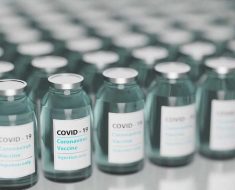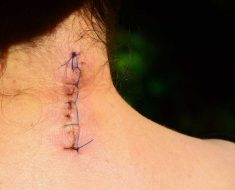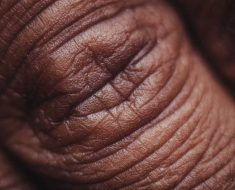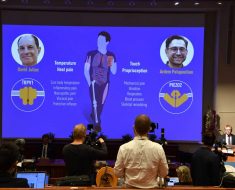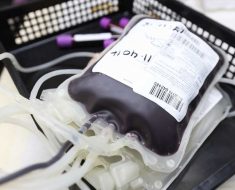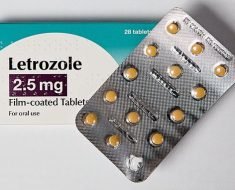- Roughly 25 percent of the U.S. population falls into an at-risk category for developing severe complications from COVID-19.
- This includes people who are immunocompromised, of which many are children.
- Wearing face masks, avoiding large crowds, and practicing good hygiene helps slow the spread and protects those who are at greater risk of death from the new coronavirus.
I never used to be the mom who worried about germs or exposure to illness. I figured all kids got sick sometimes, and that germ infestations were inevitable at day care and preschool.
It’s just how kids build their immune systems, right?
Then my daughter’s immune system started attacking her.
She was 4 years old when she was diagnosed with juvenile idiopathic arthritis (JIA), an autoimmune condition that affects her joints. Treatment involves a chemo medication I inject her with at home every week.
Because of both her condition and her medication, she was suddenly considered at heightened risk for everything.
Not only could the flu easily land my formerly healthy child in the hospital, every minor illness meant facing down a potential flare of her condition.
Her immune system, meant to protect her, had become the enemy. But fighting it down, saving her joints and long-term quality of life, meant making her susceptible to everything else.
It took me a long time to come to terms with what that meant and to find a way to live our lives without forcing her in a bubble.
Everything we did became a calculated risk. But over the years, I learned how to balance it all and allow her to have a childhood that wasn’t constantly shadowed by fear.
Then COVID-19 began sweeping the nation
The day the first case was confirmed in our home state of Alaska, my daughter’s pediatrician told me we needed to go into complete lockdown — as little in-person interaction with other people as possible.
Gwen Nichols is the chief medical officer of The Leukemia & Lymphoma Society (LLS). She says people who live with someone who’s immunocompromised, like me, need to take extra precautions to keep their loved ones safe.
Her suggestions include:
- practicing physical distancing whenever outside the home
- wearing a mask whenever possible
- washing hands regularly
- cleaning common areas and contact surfaces often
- changing clothing that was worn outside the home immediately and putting it in the wash
- leaving shoes outside or at the entryway
“These precautions not only protect your own health, but the health of those you live with,” Nichols said.
Still, I was resistant to what was being asked of me. As a single mom, I rely a great deal on my support system: my friends, who feel like family; the private school that’s always taken my daughter’s health seriously and made her feel welcomed, safe, and loved; the babysitters who give me the occasional night off to just be with other adults.
All of that was suddenly cut off from me. And that was scary, just the thought of truly being alone in my parenting journey.
But the more I thought about it, the more I realized my daughter’s doctors had never been alarmist before. If anything, they’d always fallen on the side of allowing her to have a childhood — of easing my fears and reminding me that if anything happened, we could figure it out together.
This was different. Because of the unknowns of this disease, and the fears surrounding how it may affect kids like my daughter — and anyone else at additional risk — extreme caution was being urged on all ends.
And so, we went into lockdown
For nearly 10 weeks, we saw no one.
I homeschooled her and served as her only source of in-person entertainment and engagement, all while continuing to work as much as I could. After all, as a single parent, no one else was paying my bills.
I was lucky in that I already worked from home, even before all this began — and I still had work coming in. But balancing it all was a lot.
My daughter was doing pretty well, all things considered. I was the one who was struggling deeply, eventually reaching out to my own doctor for an antidepressant prescription.
“Everyone reacts differently to stressful situations,” Nichols said, acknowledging that our new normal can lead to feelings of isolation, uncertainty, and anxiety.
“As a caregiver, you might be feeling overwhelmed with navigating your loved one’s care while looking after your own needs,” she said. “And as a family member, you might be feeling unsure of how you can help.”
I battled with guilt over my desire to be around people, even knowing doing so could put my daughter’s life at risk. None of it was simple. I wanted my daughter alive. But I also wanted for us to be able to live.
After 10 weeks, I reached out to my daughter’s doctor again and asked if anything had changed. My hope was that she might know more, that there might be reason to believe kids with my daughter’s condition would be OK branching out, even just a little bit.
Unfortunately, she told me that if I could keep my daughter in a bubble for the next year, that was what she would recommend — further suggesting I start wrapping my brain around homeschooling her in the fall, even if schools open as normal.
My heart sank. I admitted to her I wasn’t doing well with the isolation, and that I was worried about my daughter’s social development as well.
So, together, we came up with some compromises, knowing that we would have to accept a bit of risk in exchange for some social benefit.
How we cautiously began taking small risks
We decided that my daughter and I could have outdoor play dates with friends, so long as we kept those play dates to one family at a time and talked to the kids about maintaining physical distance, even while they played.
We started going on bike rides and hikes with the people we love. And while it wasn’t perfect (I yearned to hug the kids who have been calling me “auntie” since birth, and my daughter had to fight the urge to hold hands and roughhouse with the people who have always been an extended family to her), we made it work.
Largely because our extended circle loves my daughter as much as I do, and knows and respects the extra effort it will now take to keep her safe.
Unfortunately, I can’t say the same for others outside our circle.
How I deal with others who don’t understand the increased danger for my daughter
When COVID-19 hit, my one hope for this tragedy occurring around the world was that it would make people more compassionate. More empathetic. More aware of the need to care for the greater good.
In recent years, it feels like our entire country has plunged into this deep divide of us versus them, with “my rights,” “my needs,” “my point of view” being all that matters.
There was part of me that hoped this crisis would bring us together and change that.
At first, it seemed like maybe that would be true. But lately, I’ve seen more and more people resist even the small changes being asked of them to help protect others.
People fighting stores on their mask-wearing policies, or complaining about the changes schools are being asked to make next year. People up in arms over anything they perceive as an infringement on their ability to live a “normal” life.
Even though they most likely have friends and family members hoping to simply live through this.
Recognizing just how many are at risk
“[Some of] the current known preexisting conditions that are considered to be at high risk of developing COVID-19 are cancer (specifically patients currently receiving or who have recently received anticancer treatment), diabetes, heart and vascular diseases, autoimmune disorders, HIV/AIDS, preexisting tuberculosis, and patients receiving immunosuppressive medications,” explained Dr. Daniel Vorobiof, an oncologist with 40 years of experience and the medical director of Belong.Life.
He says these at-risk groups are in addition to the people over the age of 60 who also carry a known risk.
Roughly 25 percent of our population falls into these at-risk categories. That’s almost 1 in 4 Americans who have a higher risk for developing severe complications from COVID-19, or worse, face an increased risk of dying from the disease.
And many of them are children.
“Children who are immunocompromised are fragile, and we must take extra precautions to keep them safe and isolated during COVID-19 so they are not exposed to this virus,” Nichols said.
It’s not just us, it’s your loved ones too
When I share my daughter’s story, I find people who don’t know us have a tendency to want to say, “That’s sad for you, and I’m sorry, but that shouldn’t impact how I live my life.”
But the thing is, with those statistics, it’s inevitable that everyone knows and loves someone who’s at additional risk.
Everyone.
In my ideal world, you wouldn’t have to know someone like my daughter to understand the importance of some of the public health changes currently being made. You shouldn’t have to be personally affected to be willing to make a few simple changes that might help protect others.
But I’m not sure we live in that world.
I think part of the problem may be that there are a lot of people who still haven’t been personally touched by this disease. Even though COVID-19 has taken more than 110,000 lives in the United States in just over 3 months since the first death was announced.
But for families like mine, the risk is too big to ignore. And it’s hard to swallow the fact that there are those who don’t seem to care. Or worse, don’t seem to believe the risk is even real.
To be clear, I don’t want or expect the rest of the world to make the same decisions we are. I know it’s not sustainable for many, and not necessary for most.
But I do cringe when I hear people complaining about wearing masks. Or about their kids having to adjust to a new way of schooling next year. Especially when the truth is, these changes aren’t just about protecting my daughter — they’re also about protecting the millions of other Americans at risk.
The teachers who have risk factors of their own, or loved ones at home who do. The customer service workers who have to weigh protecting their own health against continuing to work and put food on the table. The aunts, uncles, and grandparents you know and love and would be devastated to lose.
Wearing a mask to help protect them shouldn’t be too much to ask.
We’re in a decidedly abnormal situation. None of it is easy, for anyone. Knowing my life and my daughter’s life will likely be drastically altered for at least the next year is incredibly hard. But I’ll do what needs to be done to help keep her alive.
I just wish more people would be willing to think about those at risk, likely people they know and love, when they refuse to make any changes at all.
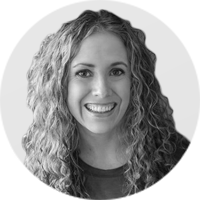
Source: Read Full Article
